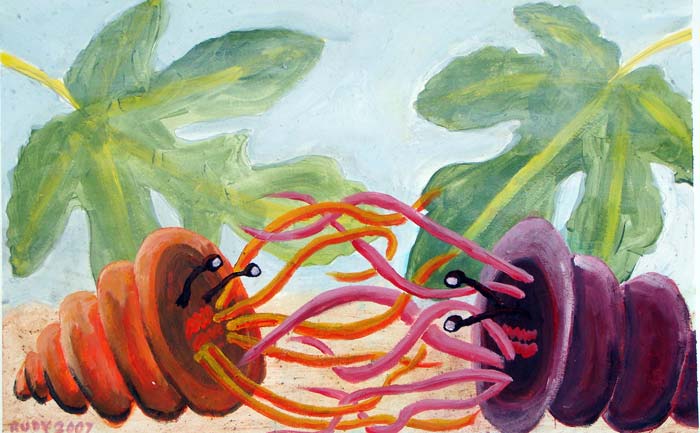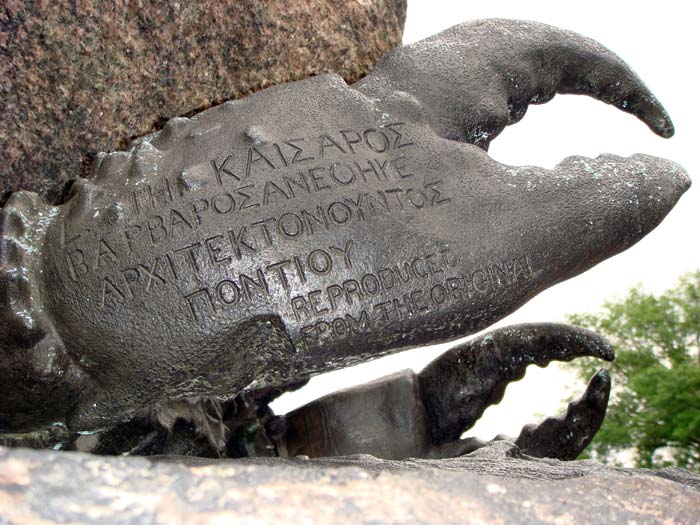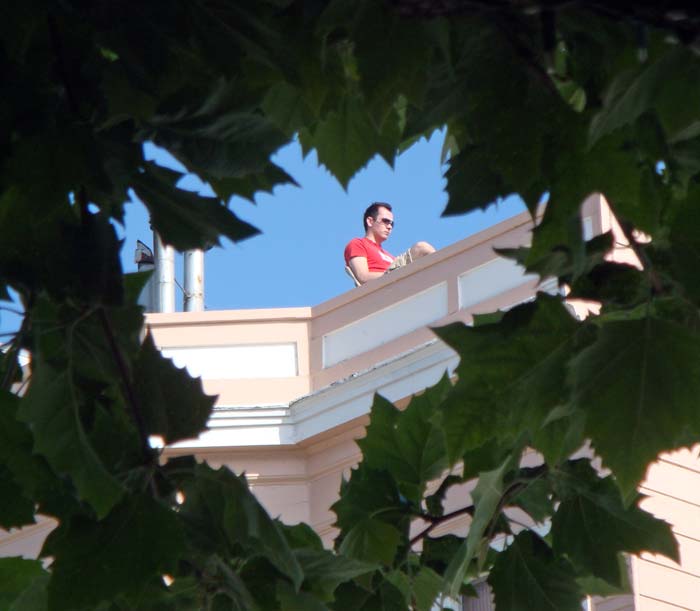
What Science Fiction is All About
or,
The Amazing Dancing Chairs
by Kathleen Ann Goonan

Lefton is a plasterer. He lives in Christopher the Farmer’s old white frame house, a rental house now, which is hidden in the folds of a small hollow, next to a spring.
I have never been inside the house, but I can imagine it. The plank floors tilt. During the summer, aluminum plates with barns or mountains painted on them cover the holes in the wall where the stovepipes go. People used to take their stoves out for the summer, or, if not the entire stove (those big Warm Mornings are heavy suckers), just the stovepipe. It’s nice to have a different look during the hot months.
You cover the couches with slipcovers, and put vases of flowers from the garden on the tables, and cope with too much heat instead of too much cold. That’s what slipcovers are for. Summer.
But until I got the junkyard chairs, I could never figure out why people put dresses on their dining room chairs, tied in the back with bows as if the chairs were demure little girls going to church. Why not put frilly white socks on the legs, and some black patent-leather shoes on them, too?
Maybe that would be nice in a museum show. I might follow up on that. I bring it up, though, because I picked up some chairs at the county dump last year.
They were strong aluminum-tube kitchen chairs with foam seats and backs, which were covered with plaid vinyl. I spray-painted the chairs all different colors—red and purple, green and yellow, and so on, the legs and the cushions different colors, and stamped big leaves all over them in contrasting colors. They were handy chairs, and the carpenters used them all winter in the house as they did the finish work, slowly. Their names were Zing—the master carpenter—and Abe, a tall, skinny black-hair guy who smoked too much and hardly ever showed up when he said he would.
I didn’t mind that the seats were torn up, because they had after all been rescued from the dump. But at that point, I had my epiphany about the potential of the chair dresses. My chairs now needed clothes. It would give them a whole new life. As epiphanies go, it wasn’t much. It is important, though, to be able to recognize the signs of an epiphany, even a small one. You never know what might turn out to be important. That’s what some of science is about. Bear with me. I’m getting to the fiction part.
I am a science fiction writer. I want to write a science fiction stories, but presently all of my ideas have to do with old cartoons, the real ones from the fifties made with millions of cells, in which chairs danced.
I could make the chairs dance now, with the power of science fiction, but that seems old and stale. Soon we will have dancing chairs, but will we be as delighted as I was when I was five to see them? Who knows? They will make moving easier, but we have to be careful, because that is the plight of being human now, the watchword. We must be very, very careful about the possible consequences of our science and the resulting technologies. I’ve even heard that it would be better not to even think in scientific ways. I don’t remember who said that, but it was someone who finds the idea of evolution irritating. They don’t mind cellophane, or television. They like to pick and choose.
I am very sure that they must be right about the dangers of science. I can think of a lot of problems. For instance, if the chairs developed consciousness and a mind of their own, what a mess that would be. As a former preschool teacher, I can tell you that if you mixed a class of four-year-olds with a roomful of dancing chairs you might as well hang it up now.
It is fun to think about, though.
Anyway, last week, I was watering our infant orchard, which is well away and above Lefton’s house, when a bullet whizzed past my head. It snicked through the leaves of the chestnut oak above me and shredded them.
At first, I wasn’t really sure it had been a bullet. After all, even though Lefton wallows in target practice just about every evening, kind of a relaxing treat after a hard day of work, and his shots boom out (loud: he must have wasted a couple of dollars on a rifle shell) or are just a burst of six delicate cracks (his .32; he’s being economical), I assumed that he kept his gun directed at the stuffed deer he keeps in his yard for target practice.
I know about the stuffed deer because last year I walked through Lefton’s yard with Christopher, who owns the white house. Christopher lives down the road in his own white house. Lefton’s house once belonged to Christopher’s uncle, who operated a still on the land we now own. Their families grew tobacco, cows, and other crops, but now Christopher owns it all and hays all summer long, into the dusk. He still grows cows.

Christopher also grows Ambrosia corn. Think of a trademark sign. He had a trial year in which he grew about six different kind of sweet corn and we all agreed that Ambrosia was the crispest, sweetest, most delicate and delicious corn, so now he grows it exclusively. This really showcases how evil the whole idea of evolution can be. You can change dull corn into sharp, sweet, Ambrosia corn. Surely this is a terrible thing. Christopher doesn’t have much of a garden, just enough corn, tomatoes, squash, and peppers for himself, some neighbors, and his family.
Last summer he kept a garden up by Lefton’s house, and told me to come on up and get some corn. I brought a basket and followed him up the driveway to Lefton’s white house, raising a chorus of howls and barks from Lefton’s numerous dogs. They strained at their chains, barking their different barks—ark, ark, hwooo, whuff, and so on, the barks which blend, up at my house, into a great dog din that can erupt day or night, any time. Sometimes I yell or whistle to start it off. This works even from far away. It’s not very nice—think of how it sounds coming through Lefton’s windows--but I feel sorry for Lefton’s dogs. They are bored out of their skulls.
We made it through the bark gauntlet, passed the bullet-riddled stuffed deer, held up by sticks and wire but listing badly, and reached a shed behind the house. The weathered gray boards were covered with raccoon, coyote, bear, and deer skins. Their heads were intact, and their legs were spread out as if they were being crucified. Lefton actually eats what he kills, so I don’t hold this against him. Really, I don’t.
We got to the cornfield. Christopher pointed to a pile of corn stalks that had been torn out of the ground. “Coyotes. They love this Ambrosia. They drag it off and eat the ears.” He and Lefton have tried lying in wait for the coyotes, but they are no match for the crafty coyotes, who adore this evil product of clever human-controlled evolution.
Sometimes the dog’s barks are laced with beautiful coyote song, late at night: canine opera. The howls are eerie and chilling. The barks are prosaic, like chopped, repeating words. Do they think they are saying something, I wonder? I know that my own dogs thought so, but probably Lefton’s dogs have never learned to think in words, having heard none except “Hey! Knock it off!” Maybe that’s what they are saying to each other in their world of bark-mirrors.
So as I watered my apple trees and tried not to contemplate a roomful of wild and recalcitrant dancing chairs carrying out science-fictional themes in a taunting way, with the attitude of hey, you invented us, deal with it and myself as the lion tamer, I was wrenched from that vision by one of Lefton’s bullets.
I was angry. Christopher said that Lefton had a little beer camp farther up the hollow, near the creek just beneath the hill our house is on. Christopher had come across it while tending his cows: a small mountain of empty Bud cans, a plastic Adirondack chair, a cooler for a table. Lefton likes the simple life. I figured, after the shot whistled by, that he was down at his beer camp, enjoying the hot summer evening with his guns and his beer. Other people watch the evening news. Lefton drinks beer and shoots guns.
I threw my hose on the ground, took cover, and yelled. I wished that I really was living in The Future, and could command my fleet of battle-chairs (now hardened soldiers, having grown up and been drafted to fight in an unpopular war, and wearing Army boots instead of patent-leather shoes) down the steep wooded hill to Lefton’s. I was not sure how they would get through Christopher’s barbed-wire fence. Perhaps they would find the place where his cows had broken it, and fly through. They would gallop down to Lefton’s beer camp and trample it, make the pile of beer cans fly, knock him in the forehead with their own (the backs of the chairs would, of course, be analogous to foreheads). Panicked, he would fire at a few, but it would be no good, they would heal almost instantly, and he would be crushed by my junkyard chairs. Maybe I would make them howl like coyotes as they attacked.
But who knows? He was drunk. Maybe he already thought this was happening. That’s why he was shooting in my direction. Maybe he knew more than I did about the true reality of my chairs. Maybe he wanted to stop evolution.
The second bullet had me on the phone calling the Sheriff. “I almost got hit by a bullet,” I told him. “I think I know who fired it.” I told him that even though it was an accident, I did not like it and I thought it was against the law.
I heard later that the Sheriff came and gave Lefton a warning. So far, that seems to have worked. At least he is saving a lot of money on ammunition.

I heard a story about Lefton once. Christopher told me.
Lefton heard a knock on his door at about two in the morning. He opened the door and an old high school classmate was standing there holding up a crucifix. He was covered in blood and his clothes were in rags.
“What are you doing here?” Lefton asked.
“I came to tell you something.”
“What?”
He shoved the bloody crucifix in Lefton’s face. “This is the soul of all the animals you’ve murdered.”
Lefton called the Sheriff, who must be a busy guy. Apparently, the man, who lived alone about two miles away, had worked himself into a righteous rage about Lefton’s murderous habits and begun his midnight odyssey, hacking his way in the dark through blackberry thickets and beaning himself on an overhanging tree limb, making his unerring way cross-country to Lefton’s house. He was truly on a mission from the animal spirits; otherwise, he would have used the road, and his car, for that matter. But he did things the hard way, and I’m sure it startled Lefton.
All around Lefton, on the ridges and hills, Vacation Log Homes wink down at him at sunset, vast blank glass walls nestled beneath massive log eaves. Granite-countered kitchens and plasma TV screens at rest await the Log Home Vacationers, who do not come as often as the owners banked on. Perhaps on the web pages for Bear Pause Cabin and Hi-Top Lodge frightened renters have left comments about coyotes howling in the night, about bullets flying around their heads. The owners of the cabins, who live in Ohio and Indiana and Florida, do not know about Lefton. They don’t know that he is illegally baiting bears, hanging up pieces of rotting meat back in the woods, and heading up there with his pack of dogs at night, accompanied by the coyote brigade, who laugh and frolic and lure the dogs away by promising to mate with them. Once the dogs are alone, the coyotes fall on them and tear them to pieces. To Lefton, this is a much worse crime than stealing Christopher’s corn. I think so too. The coyotes have learned something important about evolution.
One night last summer, my husband tried to wake me up. I am a sound sleeper, so it was very hard. We were in our one-room cabin, where we lived while we were building our big house. He said, “There’s a bear pounding on the door.”
“Um.” I tried to go back to sleep.
But then even I was awakened when the bear’s pounding shook the cabin. He was on the porch, a black shadow taller than the door. I believe he might have thought the cabin was a slightly larger than usual dumpster and was trying to knock it over. My first thought was, Where’s the camera?
My husband turned on the porch light and the bear ran away.
This was Lefton’s fault too. He is luring the bears up here with his bear baits. Then he kills them. That bear was lucky he wasn’t at Lefton’s house.
We called the game warden. He seemed uninterested. What could he prove? But it is not bear season and it is illegal to bait bears. Lefton could be fined, even jailed, for it. Someday, he might find out that he cannot ignore the laws that have grown up around him along with the Vacation Log Homes. He might find out that he is not living in the past. He is living in a Mountain Wonderland, where the bears he thinks of as food are, instead, cute and cuddly motifs stamped on every storefront and every piece of log furniture that furnishes the Vacation Log Homes.
But this might not happen. Science fiction shows us that things may not turn out as we think they will.
Some sort of WMD—an important new acronym that we all must learn, which stands for diseases and chemicals that have been around for a long time--might sweep the countryside and kill off everyone. Smallpox, anthrax. The cities might be bombed with nuclear weapons that terrorists, local or foreign, have gotten hold of. The grid might not work. All of us think about this. All the time. We are supposed to worry. Even though we are protected by our government, by the Department of Homeland Security, and various other forces (not the National Guard, though; they are in Iraq). Anyway, they are doing a good job of making us worry about these scenarios, which are well represented in science fiction.
Lefton would suffer too, of course. He’d have to brew his own beer. Home-brewed beer doesn’t always turn out well, and keeping big bags of grain around draws mice, which carry hantavirus.
But otherwise, he would be king. His hunting skills would be prized; his gun collection envied. He would survive on mammal protein, while the man with the crucifix and the Log Home Vacationers would starve to death.
And I would be forced to barter my dancing chairs for bear meat. That would be hard.
You just never know.
That’s what science fiction is all about.
Post a comment on this essay.
About the Author

Kathleen Ann Goonan has published six novels, including her Nanotech Quartet: QUEEN CITY JAZZ, MISSISSIPPI BLUES, CRESCENT CITY RHAPSODY, and LIGHT MUSIC. THE BONES OF TIME is about Princess Kaiulani, Penrose’s ideas about consciousness, and the theft of the Kingdom of Hawaii. Her thirty or so short stories have been published in venues such as ASIMOV’S, STRANGE PLASMA, INTERZONE, F&SF, OMNI ONLINE, and in various anthologies. “Sundiver Day” will appear in THE STARRY RIFT in 2008, and she has a story in ECLIPSE, which will be out in November 2007. Her latest novel, IN WAR TIMES (Tor), achieved the Review Trifecta of starred reviews in PW, Kirkus and Booklist. She lives in Florida and Tennessee.